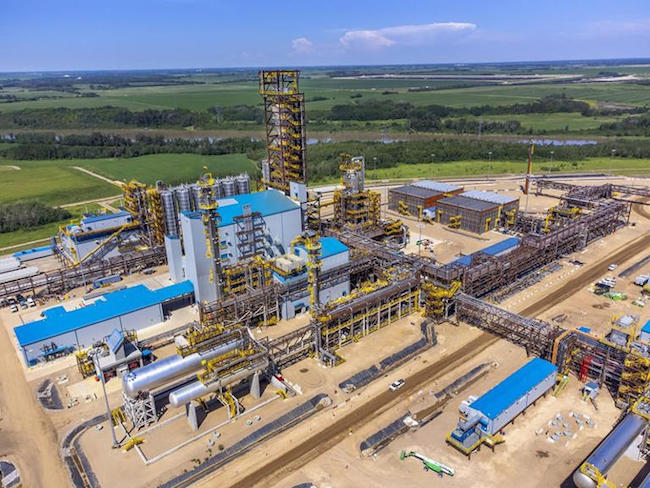Alberta
Alberta’s petrochemical sector emboldened by ruling on single use plastic ban

Federal Court ruling on plastics: Premier Smith and Minister Schulz
Premier Danielle Smith and Minister of Environment and Protected Areas Rebecca Schulz issued the following statement on the Federal Court ruling that the federal government’s unilateral decision to label plastics as ‘toxic’ was both unreasonable and unconstitutional:
“A little over a year ago, Alberta intervened with the Federal Court to argue that the federal government’s decision to unilaterally label plastic as a ‘toxic substance’ is an unconstitutional intrusion into provincial jurisdiction and a threat to our economy.
“Today, the Federal Court sided with Alberta and Saskatchewan and found that listing plastics as a toxic substance is ‘both unreasonable and unconstitutional.’
“The court also found that the federal government’s decision to label all plastics as toxic ‘poses a threat to the balance of federalism as it does not restrict regulation to only those (plastics) that truly have the potential to cause harm to the environment.’
“The court also reminded the federal government that ‘cooperative federalism recognizes that the provincial government and federal government are coordinate – the provinces are not subordinate to the federal government. A federal head of power cannot be given a scope that would eviscerate a provincial legislative competence.’
“This latest decision comes on the heels of the Supreme Court of Canada decision confirming the unconstitutionality of the federal government’s destructive Impact Assessment Act, formerly known as Bill C-69, and demonstrates a continued pattern of federal overreach intended to subvert the constitutionally protected role and rights of provinces using the criminal head of power.
“Like Bill C-69, the federal government’s decision to unilaterally label perfectly safe plastic consumer products as ‘toxic’ has had wide-ranging consequences for Alberta’s economic interests and has put thousands of jobs and billions of investments at risk.
“Alberta is proudly home to Canada’s largest petrochemical sector, a sector with more than $18 billion in recently announced projects that were needlessly put in jeopardy by a virtue-signaling federal government with no respect for the division of powers outlined in the Canadian Constitution.
“It’s time for the federal government to listen to the courts and to Canadians. We urge them to not appeal this decision, and to immediately delete ‘plastic manufactured items’ from Schedule 1 of the current Canadian Environmental Protection Act so as to avoid further need of legal action by Alberta and other provinces.”
Related information
Alberta
Alberta’s grand bargain with Canada includes a new pipeline to Prince Rupert

From Resource Now
Alberta renews call for West Coast oil pipeline amid shifting federal, geopolitical dynamics.
Just six months ago, talk of resurrecting some version of the Northern Gateway pipeline would have been unthinkable. But with the election of Donald Trump in the U.S. and Mark Carney in Canada, it’s now thinkable.
In fact, Alberta Premier Danielle Smith seems to be making Northern Gateway 2.0 a top priority and a condition for Alberta staying within the Canadian confederation and supporting Mark Carney’s vision of making Canada an Energy superpower. Thanks to Donald Trump threatening Canadian sovereignty and its economy, there has been a noticeable zeitgeist shift in Canada. There is growing support for the idea of leveraging Canada’s natural resources and diversifying export markets to make it less vulnerable to an unpredictable southern neighbour.
“I think the world has changed dramatically since Donald Trump got elected in November,” Smith said at a keynote address Wednesday at the Global Energy Show Canada in Calgary. “I think that’s changed the national conversation.” Smith said she has been encouraged by the tack Carney has taken since being elected Prime Minister, and hopes to see real action from Ottawa in the coming months to address what Smith said is serious encumbrances to Alberta’s oil sector, including Bill C-69, an oil and gas emissions cap and a West Coast tanker oil ban. “I’m going to give him some time to work with us and I’m going to be optimistic,” Smith said. Removing the West Coast moratorium on oil tankers would be the first step needed to building a new oil pipeline line from Alberta to Prince Rupert. “We cannot build a pipeline to the west coast if there is a tanker ban,” Smith said. The next step would be getting First Nations on board. “Indigenous peoples have been shut out of the energy economy for generations, and we are now putting them at the heart of it,” Smith said.
Alberta currently produces about 4.3 million barrels of oil per day. Had the Northern Gateway, Keystone XL and Energy East pipelines been built, Alberta could now be producing and exporting an additional 2.5 million barrels of oil per day. The original Northern Gateway Pipeline — killed outright by the Justin Trudeau government — would have terminated in Kitimat. Smith is now talking about a pipeline that would terminate in Prince Rupert. This may obviate some of the concerns that Kitimat posed with oil tankers negotiating Douglas Channel, and their potential impacts on the marine environment.
One of the biggest hurdles to a pipeline to Prince Rupert may be B.C. Premier David Eby. The B.C. NDP government has a history of opposing oil pipelines with tooth and nail. Asked in a fireside chat by Peter Mansbridge how she would get around the B.C. problem, Smith confidently said: “I’ll convince David Eby.”
“I’m sensitive to the issues that were raised before,” she added. One of those concerns was emissions. But the Alberta government and oil industry has struck a grand bargain with Ottawa: pipelines for emissions abatement through carbon capture and storage.
The industry and government propose multi-billion investments in CCUS. The Pathways Alliance project alone represents an investment of $10 to $20 billion. Smith noted that there is no economic value in pumping CO2 underground. It only becomes economically viable if the tradeoff is greater production and export capacity for Alberta oil. “If you couple it with a million-barrel-per-day pipeline, well that allows you $20 billion worth of revenue year after year,” she said. “All of a sudden a $20 billion cost to have to decarbonize, it looks a lot more attractive when you have a new source of revenue.” When asked about the Prince Rupert pipeline proposal, Eby has responded that there is currently no proponent, and that it is therefore a bridge to cross when there is actually a proposal. “I think what I’ve heard Premier Eby say is that there is no project and no proponent,” Smith said. “Well, that’s my job. There will be soon. “We’re working very hard on being able to get industry players to realize this time may be different.” “We’re working on getting a proponent and route.”
At a number of sessions during the conference, Mansbridge has repeatedly asked speakers about the Alberta secession movement, and whether it might scare off investment capital. Alberta has been using the threat of secession as a threat if Ottawa does not address some of the province’s long-standing grievances. Smith said she hopes Carney takes it seriously. “I hope the prime minister doesn’t want to test it,” Smith said during a scrum with reporters. “I take it seriously. I have never seen separatist sentiment be as high as it is now. “I’ve also seen it dissipate when Ottawa addresses the concerns Alberta has.” She added that, if Carney wants a true nation-building project to fast-track, she can’t think of a better one than a new West Coast pipeline. “I can’t imagine that there will be another project on the national list that will generate as much revenue, as much GDP, as many high paying jobs as a bitumen pipeline to the coast.”
Alberta
Alberta Premier Danielle Smith Discusses Moving Energy Forward at the Global Energy Show in Calgary

From Energy Now
At the energy conference in Calgary, Alberta Premier Danielle Smith pressed the case for building infrastructure to move provincial products to international markets, via a transportation and energy corridor to British Columbia.
“The anchor tenant for this corridor must be a 42-inch pipeline, moving one million incremental barrels of oil to those global markets. And we can’t stop there,” she told the audience.
The premier reiterated her support for new pipelines north to Grays Bay in Nunavut, east to Churchill, Man., and potentially a new version of Energy East.
The discussion comes as Prime Minister Mark Carney and his government are assembling a list of major projects of national interest to fast-track for approval.
Carney has also pledged to establish a major project review office that would issue decisions within two years, instead of five.
-

 Crime1 day ago
Crime1 day agoManhunt on for suspect in shooting deaths of Minnesota House speaker, husband
-

 Business21 hours ago
Business21 hours agoCarney’s European pivot could quietly reshape Canada’s sovereignty
-

 conflict6 hours ago
conflict6 hours ago“Evacuate”: Netanyahu Warns Tehran as Israel Expands Strikes on Iran’s Military Command
-

 Alberta21 hours ago
Alberta21 hours agoAlberta’s grand bargain with Canada includes a new pipeline to Prince Rupert
-

 Energy6 hours ago
Energy6 hours agoCould the G7 Summit in Alberta be a historic moment for Canadian energy?
-

 Bruce Dowbiggin5 hours ago
Bruce Dowbiggin5 hours agoWOKE NBA Stars Seems Natural For CDN Advertisers. Why Won’t They Bite?
-

 Crime5 hours ago
Crime5 hours agoMinnesota shooter arrested after 48-hour manhunt
-

 Aristotle Foundation3 hours ago
Aristotle Foundation3 hours agoThe Canadian Medical Association’s inexplicable stance on pediatric gender medicine






